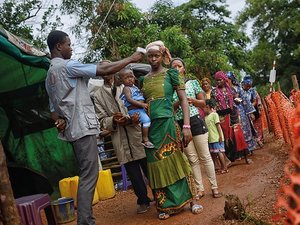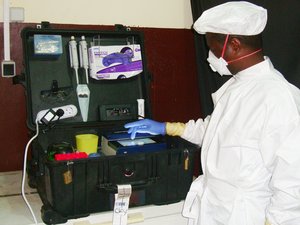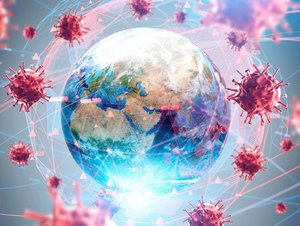Health

New infectious animal diseases that affect public health and have the capacity to cross borders will continue to emerge around the globe. These diseases could potentially develop human-to-human transmissibility; thus they incite public fear. A proactive approach to disease risk management that combines foresight, prevention, impact mitigation, early detection, and swift and effective responses is warranted.
- Activating rural voices for effective implementation of tobacco control policies(2023)
- "We have never been in a better position to end the pandemic"(2022)
- Lifesavers from the air(2020)
- Fighting farmer suicides in India through a helpline(2019)
- Snakebite brings social and financial burden among Indian farmers(2016)
- What went wrong in Ebola response?(2016)
- Between ignorance, misperception and dilemma(2016)
- The Ebola crisis and its effects on rural Sierra Leone(2016)
- Safeguard livelihoods, strengthen resilience(2016)
- Demonstrating solidarity in Africa(2016)
- Rural development – the underestimated health hazard?(2016)
- Malaria, schistosomiasis & Co.: The scourge of the “bottom billion“(2016)
- Why billions in foreign aid failed to prevent Ebola outbreak(2016)
- “We need more money for R&D on diseases of poverty!”(2016)
- Improving healthcare through ICT for India’s rural women: e-ASHA in Rajasthan(2014)
- Emergency measures or development? – Avian Influenza eradication projects(2012)
Ebola

The recent Ebola Virus Disease outbreak in West Africa claimed the lives of 11,300 people. In all, 25,601 persons were infected. But these are only the official numbers for the three countries of Guinea, Liberia and Sierra Leone – the true number of victims is thought to be considerably higher. How could the crisis assume such dramatic proportions? The authors give accounts of their analyses on Ebola outbreak and response, but also of their personal experiences during their work in the countries concerned.
- What went wrong in Ebola response?(2016)
- Between ignorance, misperception and dilemma(2016)
- The Ebola crisis and its effects on rural Sierra Leone(2016)
- Safeguard livelihoods, strengthen resilience(2016)
- Demonstrating solidarity in Africa(2016)
- Rural development – the underestimated health hazard?(2016)
- Malaria, schistosomiasis & Co.: The scourge of the “bottom billion“(2016)
- Why billions in foreign aid failed to prevent Ebola outbreak(2016)
- “We need more money for R&D on diseases of poverty!”(2016)
Impact of Covid-19

Following the outbreak of the corona pandemic, the global economy fell into its deepest recession since World War II. Existing social and economic inequalities have become further aggravated, and the world’s goal of ending hunger and poverty is getting further and further out of reach.
- Multiple crises are changing the world(2022)
- Boosting the resilience of the global financial system(2022)
- "We have never been in a better position to end the pandemic"(2022)
- Global food systems in the wake of Covid-19(2022)
- The poorest are worst hit(2022)
- Children are losing hope(2022)
- Strengthening food markets across the rural-urban continuum(2022)
- Multipurpose cash-based assistance in Covid-19 humanitarian assistance – an experience from Nepal(2022)
- New tailwind for rural tourism(2022)
One Health

Against the backdrop of current developments surrounding COVID-19, the “One Health” approach is gaining momentum. It is based on the insight that zoonoses, i.e. diseases that can be transmitted from animals to humans, can be predicted, prevented and controlled much more quickly and at a lesser cost than if the two disciplines are working separately. But the One Health concept also implies that human and animal health are intrinsically linked to the health of our environment. In other words, it is a comprehensive approach that reaches way beyond tackling infectious diseases.
- One Health – towards a more inclusive science (2020)
- Countering the double-whammy of zoonotic diseases(2020)
- COVID-19 research – what really matters(2020)
- Adopting the One Health approach in international practice(2020)
- From research to implementation strategies – One Health Capacity Building(2020)
- An interdisciplinary centre of excellence for pastoralists in the Horn of Africa (2020)
- Towards better livelihoods of livestock-keeping communities(2020)
- Focusing on infectious diseases is not enough(2020)
- "We have to prepare for the unexpected"(2020)
- How can we make the livestock sector more resilient?(2020)
- One Health and wildlife trade(-offs) – preventing future pandemics(2020)
- We still remain too much in the academic area(2020)
- Uniting One Health and food systems for a more sustainable and inclusive world(2020)



